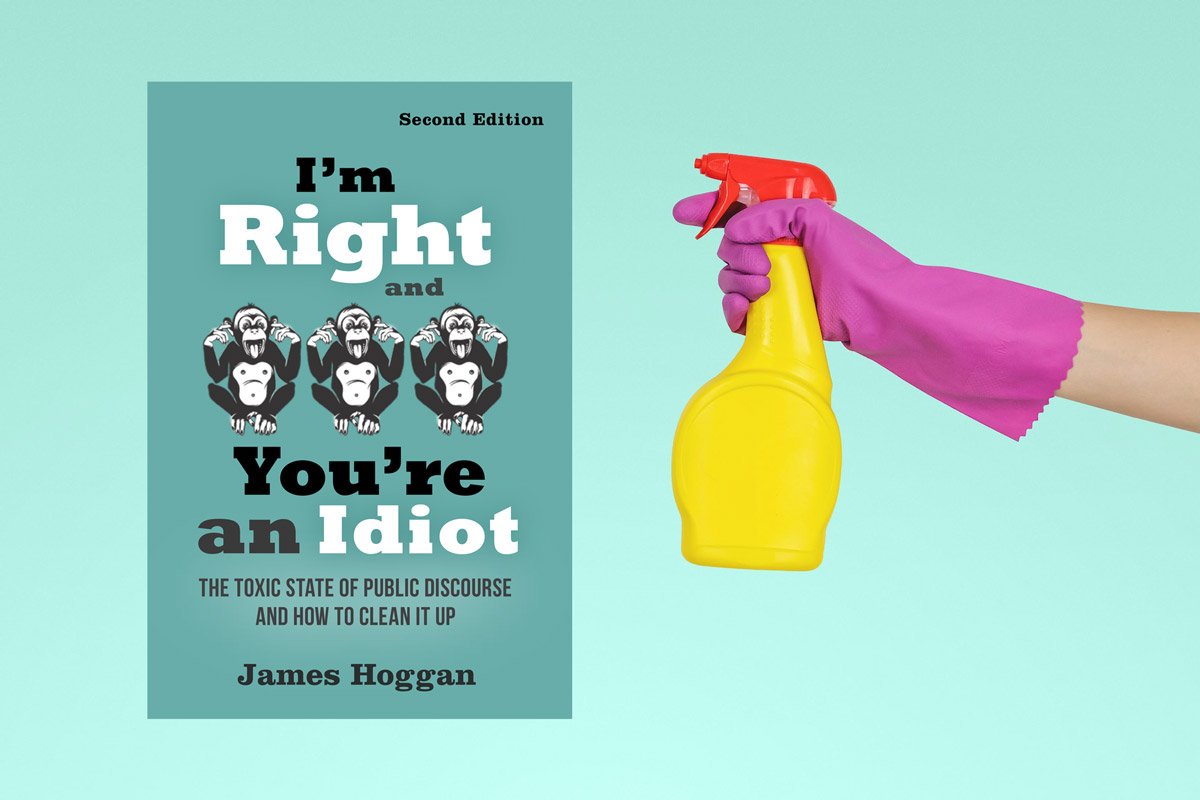 Terry Kemple is a retired GP living in Bristol. He has various roles promoting greater sustainability in general practice. He is a past President of the Royal College of General Practitioners. He is on Twitter: @TKemple
Terry Kemple is a retired GP living in Bristol. He has various roles promoting greater sustainability in general practice. He is a past President of the Royal College of General Practitioners. He is on Twitter: @TKemple
Modern democracies try to tolerate most differences in opinions. Many differences may not matter too much, but some like pandemics and climate change are existential problems that affect everyone, and agreement on their cause and how to respond should benefit us all. Why is consensus so difficult?
Originally published in 2016 and updated in 2019, James Hoggan tries to answer this question. His background is in public relations in Canada. He is a past chair of a charity empowering people to take action in their communities on environmental challenges, and was a founder of the DeSmog website that focuses on climate change.
Hoggan explores how to achieve consensus and why facts are often ignored in forming opinions. His aim is to create the spaces for public discussion where good science and passionate opinion can shape constructive conversations. The environmental crisis is used to study the gap between the scientific evidence about harming the planet and our lack of response to that threat. In searching for answers, he interviews over 70 leading thinkers. This includes the Dalai Lama, Peter Senge, Karen Armstrong, and Noam Chomsky. The chapters in each section cover a selection of 25 of the interviewees’ thoughts on the problems that stifle cooperation, and what it takes to communicate well, especially with people we don’t understand or who seem unreasonable.
There are no definitive answers but there are insights and practical advice. There is guidance on what does not work, and suggestions for what might work better. Here are a few.
“There are no definitive answers but there are insights and practical advice.”
Facts are not persuasive. We should not rely on our own understanding of facts to persuade others. We should switch to use the language of values, because facts are always framed. Frames are the value-coated windows through which we see the world. These values are applied when we judge if something is good, proper, and desirable.
Change is difficult. Once we have fixed our mind it’s difficult to change it. We are not willing to sacrifice immediate benefits for an unpredictable future benefit. We may not resist change, but we do resist being changed from the outside. Telling people what to think is a bad idea. Create a real conversation not a sales pitch. Change happens when something makes sense to us deeply.
Constructive disagreement is good. If we want better decision making, we need more debate and controversy, not less. Any discussion should aim to bring out truth rather than defeat an opponent. More self-awareness and self-control with less rancour lets us hear what others are saying and begin to communicate. We need to aim for active listening in dialogue to find common ground instead of polarisation. Start with inquiry and then focus on things that are already moving. We need to be collaborators working on the global problems we face.
Engage with the persuadable. These are the open-minded who are already predisposed to change. Typically these may be younger people. Some people will be locked into their opinions but for most it is possible to have mind-changing conversations. Look for an attitude where they recognise they cannot get where they want to alone. We do need to agree that something needs to be done, but don’t need to agree on the solution or the problem. We need to understand that the only way to go forward is by collaborating.
“There is a reason to be hopeful … Consensus is difficult but not impossible … “
Repeat the message. And keep repeating simple, clear, and compelling messages from a variety of trusted messengers. The culture of science is not to repeat what is already known, which is less effective when communicating to the general public. We need to repeat over and over again. Propaganda succeeds with its constant repetition. It becomes easier to use that implanted information than search for a more complicated truth.
Expose the propaganda. We all have ideas formed by manipulation, gas lighting, and the misinformation campaigns. So much noise is broadcasted it’s difficult to hear the truth. Too much information overwhelms our capacity to process that information. We can’t figure out everything so instead we have to decide who to trust. We turn to others to lead us — usually people who are attractive and hold strong opinions. They may use twisted meanings, improbable statements, and meaningless language like clean coal and ethical oil.
Tell your own story. It’s through the narrative of storytelling that we learn to access the moral and emotional resources needed to break the inertia of habit and respond to challenges. Stories have three important components: first, your own ‘story of self’ communicates the values that called you to action; second, the ‘story of us’ brings to life the common values we share; and finally, the ‘story of now’ turns the present challenge into the moment we must find sources of hope and courage to act.
Narrative failure results in miscommunication. Don’t concentrate on the environment. Instead, use economic revitalisation, employment, technological leadership, and national security to move political consensus. Paint a picture of a brighter future. Don’t say protecting what we have is the best we can do. Do say the price of not changing is to live in an overheated world, we need to develop wise, forward-thinking strategies, and we are gambling with young peoples’ lives.
There is a reason to be hopeful — most people are good people, and our greatest survival strategy has always been foresight and the ability to use our intelligence to overcome adversity. Consensus is difficult but not impossible if we know what to do.
Featured book: James Hoggan, I’m Right and You’re an Idiot. The Toxic State of Public Discourse and How to Clean it Up. 2nd edn, New Society Publishers, 2019, PB, 304pp, £11.69, 978-0865719149
Featured photo by JESHOOTS.COM on Unsplash.






